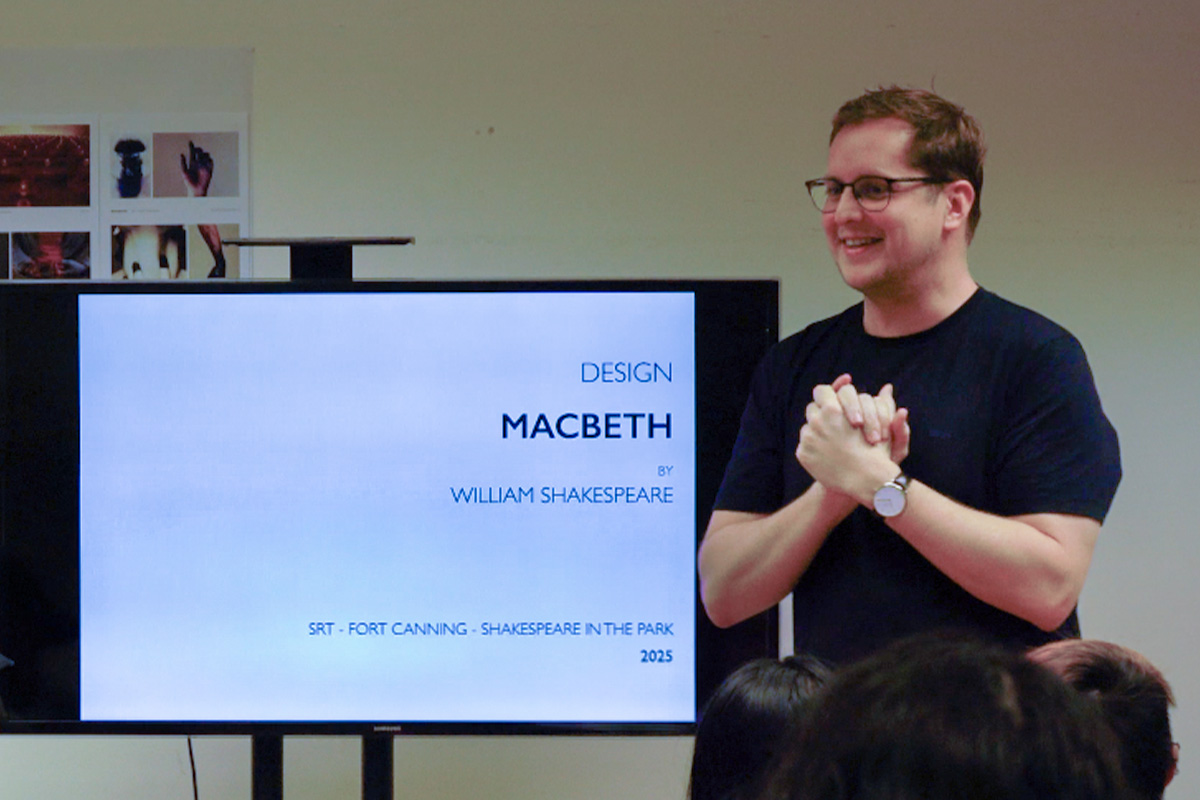
Award-winning director, Guy Unsworth, returns for his third Shakespeare in the Park production, this time bringing a bold, futuristic twist to Macbeth. This electrifying reimagining transforms the classic tragedy into a high-stakes futuristic epic, amplifying the drama.
Following his work on A Midsummer Night’s Dream and Julius Caesar, Guy shares his vision for this grand production, the creative possibilities of staging Shakespeare at Fort Canning Park, and why this Macbeth will be an unforgettable experience for all.
Your vision for this production reimagines Macbeth in a futuristic, sci-fi-inspired world. What inspired this direction, and how does it change the way we experience the story?
Guy Unsworth: I wanted to retain the epic scale of Macbeth—a story rooted in power, ambition, kingdoms, land, divine kingship, gender, and the supernatural. The original setting of Scottish royalty during political turmoil feels both grand and resonant. In reimagining it for young people today, and a Singaporean audience, I felt it was crucial not to diminish that sense of magnitude but to translate it into a world that feels equally vast and meaningful.
Culturally, we are still deeply connected to large-scale sci-fi narratives in film, gaming, and literature—stories of power, magic, and alternate realities. These worlds feel both like an escape and a mirror to our own. Setting Macbeth in a futuristic, sci-fi-inspired universe allows us to immerse ourselves in a heightened, magical world, while also reflecting back on the dynamics and power structures we recognize in contemporary society.

Director Guy Unsworth for Shakespeare in the Park – Macbeth during a design presentation with the cast, crew, and creative team.
Macbeth is one of Shakespeare’s darkest and most intense plays. How are you bringing out the thriller-like elements to make it gripping for modern audiences?
Guy Unsworth: The park setting really lends itself to the thriller elements of Macbeth because it demands a theatricality and energy. To reach even those at the very back, the performances have to be visceral and soul-driven, which naturally feeds into the urgent, suspenseful pace that runs through the play.
We’ve also reimagined the witches for this world. Traditionally, they’ve shaped the cliché of the Halloween witch—with talk of frog’s legs, dragon’s tongues, and cauldrons—which, while iconic, can feel a bit theatrical and even playful, like something we leaned into with A Midsummer Night’s Dream a couple of years ago. But for Macbeth, which thrives on fear and dread, we needed something more unsettling and contemporary.
In this futuristic setting, where knowledge equals power, we’ve drawn inspiration from AI—these omnipresent engines we increasingly trust to predict outcomes and shape our decisions. There’s something both awe-inspiring and deeply unnerving about that. So, we’ve reconceived the witches as personifications of AI, beings that manipulate information and shape destinies beyond human comprehension. It feels like a chillingly relevant update that deepens the thriller-like tension of the play.

Model of the set for Shakespeare in the Park – Macbeth against the set that’s currently being built at Pekan Nanas, Johor Bahru.
Shakespeare in the Park is known for its grand scale and immersive experience. What challenges and opportunities does directing an outdoor production bring?
Guy Unsworth: One of the biggest challenges with Shakespeare in the Park is that everything starts with the location. We don’t have the structure of a traditional theatre, so we have to consider every aspect—from how the audience arrives, to where the actors change, to how the set and space will shape the overall experience. The “theatre” begins long before anyone reaches the stage.
We also have to think carefully about how we tell the story visually and physically, because in a large outdoor space, many audience members—especially those seated further back—won’t catch subtle facial expressions or small gestures. In that sense, the sound world has to function almost like a radio play: clear, dynamic, and driven by voice and storytelling.
But that’s also where the opportunity lies. The park gives us scale and freedom, and we’re using that to bring the action closer to the audience. We’ve designed substages within the crowd, creating moments that feel immersive and personal. This feels particularly fitting for Macbeth, where tension and paranoia run high. We want the audience to feel like they are part of this uneasy world.
For those who may think Shakespeare isn’t for them, what would you say to convince them that this Macbeth is the perfect introduction?
Guy Unsworth: Like many people, I found Shakespeare difficult to engage with when I was younger. It’s often taught as something dense or academic, and that can be off-putting. So as a director, I’m interested in making Shakespeare accessible, exciting and easy to follow.
If anyone is expecting a slow, traditional production full of hard-to-follow language, I’d encourage them to come and be surprised. What we’re offering is fast-paced, cinematic storytelling, with phenomenal actors, a powerful original score, breathtaking puppetry, and all the spectacle that Shakespeare in the Park is known for.
Plus, it’s not too long, you can relax with a picnic under the stars, and enjoy something totally unique to Singapore. I truly believe there’s no better way to experience Shakespeare for the first time than singapore’s iconic Shakespeare in the Park.
Shakespeare in the Park – Macbeth runs from 7 May – 1 Jun 2025 at Fort Canning Park. Get your tickets here.



